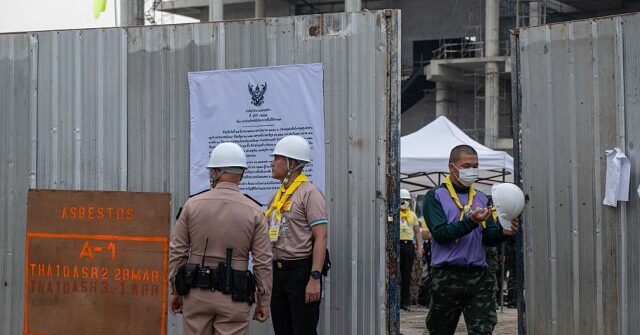The military junta that rules Myanmar admitted on Wednesday that its forces fired “warning shots” at a Chinese convoy that was attempting to deliver humanitarian aid to victims of Friday’s devastating earthquake.
The junta has been heavily criticized for interfering with relief efforts, blocking telecommunications, and continuing its devastating airstrikes against rebel positions.
A nine-vehicle convoy from the Red Cross Society of China was bringing earthquake relief supplies to the Mandalay region on Tuesday when a group of junta soldiers blocked the road and fired three shots at them.
The incident was first reported by rebels from a group called the Ta’ang National Liberation Army (TNLA), which said its troops would escort the relief trucks the rest of the way to their destination.
A junta spokesman on Wednesday admitted the encounter took place, but claimed the soldiers had not been told a relief convoy was on the way. The spokesman stressed that no one was injured in the encounter.
Junta chief Min Aung Hlaing insisted his forces have only interfered with “terrorist activities” and only “responded when attacked.”
“The government has continuously kept the door open to meet and discuss with all ethnic armed organizations to make effective peace efforts,” he insisted.
In truth, the exiled civilian government of Myanmar — overthrown by Hlaing’s troops in a February 2021 coup — and several insurgent groups, including the TNLA, declared a unilateral ceasefire after Friday’s devastating quakes, while the junta continued launching airstrikes.
Humanitarian groups blasted the junta for disrupting communications, blocking roads, and continuing its deadly airstrikes after more than 2,800 people were killed by the earthquake.
The International Crisis Group (ICG) noted on Wednesday that coordinating activities in rural Myanmar was difficult even before the quake, because the junta prefers to block out Internet and cell phone access to areas under rebel control.
“Myanmar’s junta cannot be trusted to respond to a disaster of this scale,” complained Human Rights Watch (HRW) Asia director Bryony Lau.
“Concerned governments and international agencies need to press the junta to allow full and immediate access to survivors, wherever they are,” Lau urged.
Amnesty International (AI) likewise condemned the junta for dropping bombs on people who were still trying to rescue survivors trapped beneath earthquake debris.
“You cannot ask for aid with one hand and bomb with the other. Carrying out air strikes and attacking civilians in the same region where the earthquake struck is inhumane and shows a blatant disregard for human rights,” said AI Myanmar researcher Joe Freeman.
“Myanmar’s military has a longstanding practice of denying aid to areas where groups who resist it are active,” Freeman added.
Eyewitnesses from the quake zone said junta forces are stretching out their resources by conducting aerial attacks with motorized hang gliders known as “paramotors.” These vehicles are inexpensive and use much less fuel than full-sized aircraft, but they are not exactly precision strike weapons. Civilian observers compared the sound of the paramotor attacks to the incessant buzzing of chainsaws in the sky.
Australia on Wednesday announced another $4.1 million in humanitarian support for earthquake victims in Myanmar, along with promises that the money will be given to “thoroughly vetted international and local partners,” rather than junta officials.
“We take proactive steps to ensure our assistance does not legitimize the military regime in Myanmar,” said Australian Foreign Minister Penny Wong.
The junta has prevented both local and international media from covering the aftermath of the quake, but a local source told Sky News on Tuesday that a large number of both dead bodies and living survivors remain trapped beneath the wreckage of buildings in Mandalay, which is Myanmar’s second-largest city.
“A lot of local assistance associations like charity groups are still struggling with digging out the corpses, the dead bodies, from the destruction,” the source said.
The Mandalay source said humanitarian assistance cannot be rendered to victims in Mandalay without permission from the military government.
“If they don’t have permission, then they cannot do anything,” he said.
Read the full article here
